
Gothic fiction, sometimes called Gothic horror, is a loose literary aesthetic of fear and haunting. The name refers to Gothic architecture of the European Middle Ages, which was characteristic of the settings of early Gothic novels.

Horror is a genre of fiction that is intended to disturb, frighten or scare. Horror is often divided into the sub-genres of psychological horror and supernatural horror, which are in the realm of speculative fiction. Literary historian J. A. Cuddon, in 1984, defined the horror story as "a piece of fiction in prose of variable length... which shocks, or even frightens the reader, or perhaps induces a feeling of repulsion or loathing". Horror intends to create an eerie and frightening atmosphere for the reader. Often the central menace of a work of horror fiction can be interpreted as a metaphor for larger fears of a society.

Montague Rhodes James was an English author, medievalist scholar and provost of King's College, Cambridge (1905–1918), and of Eton College (1918–1936). He was Vice-Chancellor of the University of Cambridge (1913–1915).

William Joseph Martin, formerly Poppy Z. Brite, is an American author. He initially achieved fame in the gothic horror genre of literature in the early 1990s by publishing a string of successful novels and short story collections. He is best known for his novels Lost Souls (1992), Drawing Blood (1993), and Exquisite Corpse (1996). His later work moved into the genre of dark comedy, with many stories set in the New Orleans restaurant world. Martin's novels are typically standalone books but may feature recurring characters from previous novels and short stories. Much of his work features openly bisexual and gay characters.

Nancy A. Collins is an American horror fiction writer best known for her series of vampire novels featuring her character Sonja Blue. Collins has also written for comic books, including the Swamp Thing series, Jason vs. Leatherface, Predator: Hell Come A' Walkin' and her own one-shot issue Dhampire: Stillborn.
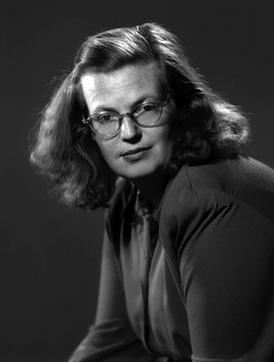
Shirley Hardie Jackson was an American writer known primarily for her works of horror and mystery. Over the duration of her writing career, which spanned over two decades, she composed six novels, two memoirs, and more than 200 short stories.
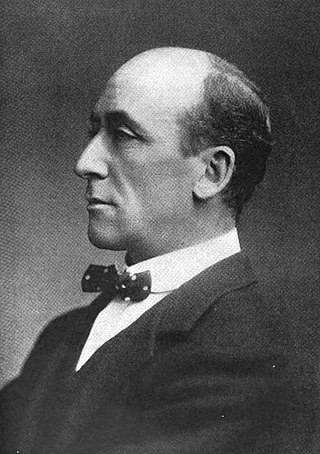
Algernon Henry Blackwood, CBE was an English broadcasting narrator, journalist, novelist and short story writer, and among the most prolific ghost story writers in the history of the genre. The literary critic S. T. Joshi stated, "His work is more consistently meritorious than any weird writer's except Dunsany's" and that his short story collection Incredible Adventures (1914) "may be the premier weird collection of this or any other century".

John Shirley is an American writer, primarily of horror, fantasy, science fiction, dark street fiction, westerns, and songwriting. He has also written one historical novel, a western about Wyatt Earp, Wyatt in Wichita, and one non-fiction book, Gurdjieff: An Introduction to His Life and Ideas. Shirley has written novels, short stories, TV scripts and screenplays—including The Crow—and has published over 84 books including 10 short-story collections. As a musician, Shirley has fronted his own bands and written lyrics for Blue Öyster Cult and others. His newest novels are Stormland and Axle Bust Creek.
Weird fiction is a subgenre of speculative fiction originating in the late 19th and early 20th centuries. Weird fiction either eschews or radically reinterprets ghosts, vampires, werewolves, and other traditional antagonists of supernatural horror fiction. Writers on the subject of weird fiction, such as China Miéville, sometimes use "the tentacle" to represent this type of writing. The tentacle is a limb-type absent from most of the monsters of European folklore and gothic fiction, but often attached to the monstrous creatures created by weird fiction writers, such as William Hope Hodgson, M. R. James, Clark Ashton Smith, and H. P. Lovecraft. Weird fiction often attempts to inspire awe as well as fear in response to its fictional creations, causing commentators like Miéville to paraphrase Goethe in saying that weird fiction evokes a sense of the numinous. Although "weird fiction" has been chiefly used as a historical description for works through the 1930s, it experienced a resurgence in the 1980s and 1990s, under the label of New Weird, which continues into the 21st century.
"The Lottery" is a short story by Shirley Jackson that was first published in The New Yorker on June 26, 1948. The story describes a fictional small American community which observes an annual tradition known as "the lottery", which is intended to ensure a good harvest and purge the town of bad omens. The lottery, its preparations, and its execution are all described in detail, though it is not revealed until the end what actually happens to the person selected by the random lottery: the selected member of the community is stoned to death by the other townspeople.
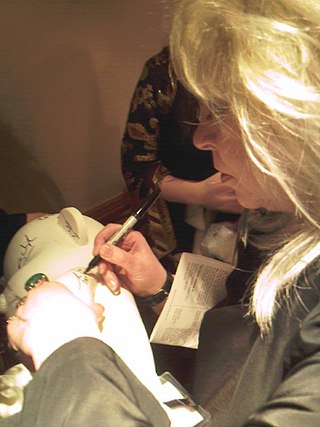
Tanith Lee was a British science fiction and fantasy writer. She wrote more than 90 novels and 300 short stories, and was the winner of multiple World Fantasy Society Derleth Awards, the World Fantasy Lifetime Achievement Award and the Bram Stoker Award for Lifetime Achievement in Horror. She also wrote a children's picture book, and many poems. She wrote two episodes of the BBC science fiction series Blake's 7. She was the first woman to win the British Fantasy Award best novel award, for her book Death's Master (1980).

A ghost story is any piece of fiction, or drama, that includes a ghost, or simply takes as a premise the possibility of ghosts or characters' belief in them. The "ghost" may appear of its own accord or be summoned by magic. Linked to the ghost is the idea of a "haunting", where a supernatural entity is tied to a place, object or person. Ghost stories are commonly examples of ghostlore.
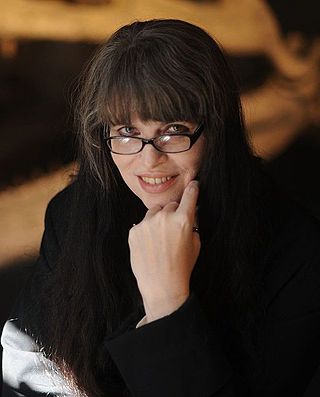
Caitlín Rebekah Kiernan is an Irish-born American paleontologist and writer of science fiction and dark fantasy works, including 10 novels, series of comic books, and more than 250 published short stories, novellas, and vignettes. Kiernan is a two-time recipient of both the World Fantasy and Bram Stoker awards.
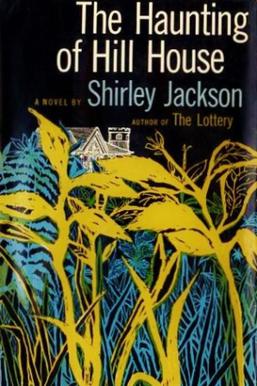
The Haunting of Hill House is a 1959 gothic horror novel by American author Shirley Jackson. It was a finalist for the National Book Award and has been made into two feature films and a play, and is the basis of a Netflix series.
Suburban Gothic is a subgenre of Gothic fiction, art, film and television, focused on anxieties associated with the creation of suburban communities, particularly in the United States and the Western world, from the 1950s and 1960s onwards.

The Lottery and Other Stories is a 1949 short story collection by American author Shirley Jackson. Published by Farrar, Straus, it includes "The Lottery" and 24 other stories. This was the only collection of her stories to appear during her lifetime. Her later posthumous collections were Come Along with Me, edited by Stanley Edgar Hyman, and Just an Ordinary Day and Let Me Tell You, edited by her children Laurence Jackson Hyman and Sarah Hyman Stewart.
"The Lovely House" is a gothic short story and weird tale by American writer Shirley Jackson, first published in 1950. The story features several overtly gothic elements, including a possibly haunted house, doubling, and the blurring of real and imaginary. It appeared under the title "A Visit" in New World Writing, No. 2, 1952.
American gothic fiction is a subgenre of gothic fiction. Elements specific to American Gothic include: rationality versus the irrational, puritanism, guilt, the uncanny, ab-humans, ghosts, and monsters.
Exotic Gothic is an anthology series of original short fiction and novel excerpts in the gothic, horror and fantasy genres. A recipient of the World Fantasy Award and Shirley Jackson Awards, it is conceptualized and edited by Danel Olson, a professor of English at Lone Star College in Texas.
Anne Fuller was an Irish novelist in the Gothic genre. She was one of the earliest women writers of Gothic fiction.












